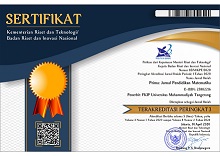Analysis of Students’ Critical Thinking Skills Based on Mathematical Resilience
Abstract
Keywords
Full Text:
PDFReferences
Agry, F. P., Kartono, YL Sukestiyarno, & Masrukan. (2023). The Mathematics Connection of Teacher Candidates to Solve Mathematics Problems of Primary School Teacher Candidates. In Journal of Higher Education Theory and Practice (Vol. 23, Issue 10).
Fazryn, M., Adiansha, A. A., Syarifudin, S., Mariamah, M., & Diana, N. (2023). Implementasi Model Problem Based Learning Berbasis Aplikasi Geogebra untuk Meningkatkan Kemampuan Bernalar Kritis Matematika pada Siswa Sekolah Dasar. JagoMIPA: Jurnal Pendidikan Matematika Dan IPA, 3(1), 42–51. https://doi.org/10.53299/jagomipa.v3i1.279
Kain, C., Koschmieder, C., Matischek-Jauk, M., & Bergner, S. (2024). Mapping the landscape: A scoping review of 21st century skills literature in secondary education. In Teaching and Teacher Education (Vol. 151). Elsevier Ltd. https://doi.org/10.1016/j.tate.2024.104739
Lee, C. and S. J.-W. (2017). The Construct of Mathematical Resilience. In In E (E) (Ed.), Understanding Emotions in Mathematical Thinking and Learning (pp. 269–291). Academic Press.
Nugraheni, N., YL Sukestiyarno, Wardono, & Masrukan. (2022). Student’s Learning Independence Profiles in Solving HOTS Questions Related to Numeracy. In Journal of Higher Education Theory and Practice (Vol. 22, Issue 15). https://doi.org/10.33423/jhetp.v22i15.5557
PISA. (2023). PISA 2022 Results Factsheets Indonesia PUBE. https://oecdch.art/a40de1dbaf/C108.
Rahmawati, C. (2019). Analisis Kemampuan Komunikasi Siswa Menengah terhadap Resiliensi Matematis. X.
Ridlo, A. Z., & Rukmigarsari, E. (2021). Pengaruh Habit of Mind dan Resiliensi Matematis Terhadap Kemampuan Berpikir Kritis Materi Pola Bilangan pada Peserta Didik Kelas VIII MTS MA’ARIF SUKOREJO (Vol. 16, Issue 12).
Rifdah, & Cahya, E. (2020). Peningkatan Kemampuan Berpikir Kritis Matematis dan Resiliensi Matematis Siswa SMP dengan Menggunakan Modified Eliciting Activities. 11(2), 87–92. https://doi.org/10.31764
Seventika, S. Y., Sukestiyarno, Y. L., & Mariani, S. (2018). Critical thinking analysis based on Facione (2015) - Angelo (1995) logical mathematics material of vocational high school (VHS). Journal of Physics: Conference Series, 983(1). https://doi.org/10.1088/1742-6596/983/1/012067
Sulistiani, E., Waluya, S. B., & Masrukan. (2018). The analysis of student’s critical thinking ability on discovery learning by using hand on activity based on the curiosity. Journal of Physics: Conference Series, 983(1). https://doi.org/10.1088/1742-6596/983/1/012134
Sumarni, W., & Kadarwati, S. (2020). Ethno-stem project-based learning: Its impact to critical and creative thinking skills. Jurnal Pendidikan IPA Indonesia, 9(1), 11–21. https://doi.org/10.15294/jpii.v9i1.21754
Virdinarti Putra, L., Sukestiyarno, Masrukan, & Widodo, J. (2024). Integrating numeration in mathematics learning. Edelweiss Applied Science and Technology, 8(4), 1699–1710. https://doi.org/10.55214/25768484.v8i4.1546
Wahidah, F., Asih Miatun, dan, & ProfDrHamka, M. (2022). Profil Kemampuan Berpikir Kritis Siswa Berdasarkan Resiliensi Matematis Siswa SMA pada Pembelajaran New Normal. ANARGYA: Jurnal Ilmiah Pendidikan Matematika, 5(2). http://jurnal.umk.ac.id/index.php/anargya
Wesna, M., Wardono, & Masrukan. (2021). Mathematical literacy ability in terms of the independent learning students on reciprocal teaching learning models with approaching RME assisted by google classroom. Journal of Physics: Conference Series, 1918(4). https://doi.org/10.1088/1742-6596/1918/4/042040
Zakiyah, L. (2019). Berpikir Kritis dalam Konteks Pembelajaran. Erzatama Karya Abadi.
DOI: http://dx.doi.org/10.31000/prima.v9i3.14523
Article Metrics
Abstract - 949 PDF - 237Refbacks
- There are currently no refbacks.
Prima: Jurnal Pendidikan Matematika
Program Studi Pendidikan Matematika
Fakultas Keguruan dan Ilmu Pendidikan
Universitas Muhammadiyah Tangerang
Jl. Perintis Kemerdekaan I/33, Cikokol
Kota Tangerang, Indonesia
e-mail: primajpm@gmail.com
Prima: Jurnal Pendidikan Matematika (p-ISSN: 2579-9827 | e-ISSN: 2580-2216) is licensed under a Creative Commons Attribution 4.0 International License.







